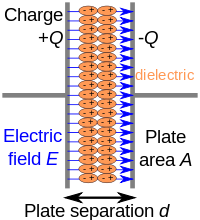
Photo from wikipedia
Abstract Gases or supercritical fluids (SCF) are widely used in polymer science and engineering, as their dissolution into polymeric materials will alter their inherent thermal properties; including melting and crystallization… Click to show full abstract
Abstract Gases or supercritical fluids (SCF) are widely used in polymer science and engineering, as their dissolution into polymeric materials will alter their inherent thermal properties; including melting and crystallization temperatures (Tm and Tc). One possible method to determine these temperatures, at elevated pressures, is to use a high-pressure differential scanning calorimeter (HP-DSC). However, the elevated pressures used in HP-DSC may result in signal instabilities, limiting the testing window for these pressures. This study presents a novel testing system using dielectric measurements to determine the effects of dissolved gas/SCF on the Tm and Tc of polymers. We have developed an instrument to determine the dielectric properties of both polymer/gas and polymer/SCF mixtures, at elevated pressures and temperatures. Using the change in the measured dielectric constant or loss, Tm and Tc were determined. The effects of hydrostatic pressure and plasticization due to dissolved carbon dioxide (CO2) and Helium (He) on the Tm and Tc of high density polyethylene (HDPE) are presented and discussed. Both Tm and Tc increase with pressure and decrease due to plasticization, i.e., pressure and plasticization are competing variables. The dissolution of He, having a low solubility into HDPE, reveals that pressure is the dominant effect. In contrast, the dissolution of CO2, having a high solubility into HDPE, shows that plasticization is predominant.
Journal Title: Polymer Testing
Year Published: 2020
Link to full text (if available)
Share on Social Media: Sign Up to like & get
recommendations!